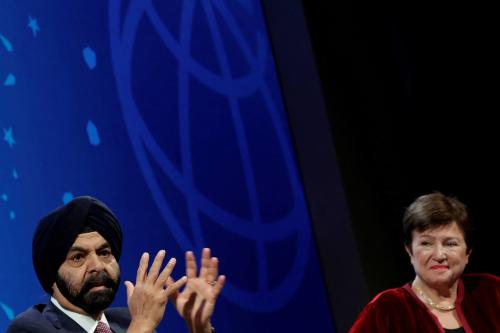With two qualifications, the London Summit was a success.
First, it was a success measured against “reasonable” expectations. Some experts and even more commentators, as usual, had unrealistic expectations about the results of the London Summit.
Second, no one really knows what will be necessary to restore growth in the global economy and to stabilize national banking systems that are burdened with “toxic assets.” The measures already taken and announced at the G-20 Summit will, hopefully, be sufficient.
People everywhere should understand, however, that there are no obvious or easy paths out of a global crisis of this nature. Fortunately, politicians and policymakers in every country understand that they will gain from a return to normalcy. Consequently they will continue to adjust the global strategy to achieve this outcome.
The odds of seeing any impact of the London Summit on the global economy in the short term are very small. The nature of the current crisis precludes any major improvements before the G-8 Summit meeting (being expanded to include leaders from more than 20 countries) that will be held in Italy in mid-July. Some improvement in the outlook for the global economy could be visible, however, by the time of the next G-20 Summit, which will take place in New York in September.
When the recovery does take hold, most likely in 2010, it will not be possible to attribute the progress to any single meeting or set of policies. There are just too many moving parts. If global growth resumes in 2010, what can be said is that the efforts of the G-20 countries as a group—and the efforts of many other countries, acting all together—were successful in avoiding a potentially longer and more damaging crisis.
The communiqué issued at the conclusion of the London Summit reflects three distinct “voices” in the G-20.
The U.S. voice is reflected in the emphasis on a joint effort to restore global growth. The point was made most vividly at a press event on the eve of the meeting when President Obama said “. . . the world has become accustomed to the United States being a voracious consumer market and the engine that drives economic growth worldwide. . . . if there’s going to be renewed growth, it can’t just be the United States as the engine.”
The European voice is reflected in the decision to establish the new Financial Stability Board to make sure the problem of inadequate regulation and supervision of banks and other financial firms is fixed.
The voice of Asia is reflected in the decision to accelerate the timetable for giving emerging market countries more voting power in the International Monetary Fund and at the same time more than triple the resources of the IMF to help member countries mitigate the impact of the crisis.
Above all, the mix of voices reflected in the London Summit communiqué represents substantial progress compared to the pre-crisis pattern where the voices of the G-7 countries, or more narrowly the United States and Europe, crowded out other voices.
Some commentators have suggested that just two countries, the United States and China, have the capacity to put the global economy back on track—if they work together.
In theory, there could be some basis for this opinion, but the reality is that domestic political forces limit what the United States government can do as well as what the Chinese government can do. Obviously there are additional steps that both countries could take that would be helpful, such as rolling back protectionist measures.
What could help most to speed the global recovery is for citizens and politicians in these two countries to support high-impact measures by their governments that are still being blocked by certain wealthy and powerful groups.
One of the most intriguing developments related to the G-20 Summit was the proposal by Governor Zhou of the People Bank of China to move away from an international monetary system based on the U.S. dollar to one based on the IMF’s own currency, Special Drawing Rights or SDRs.
It is very difficult for experts in the West, and perhaps even in China, to know what significance to attach to this proposal. It is equally difficult to know—based on its official statements—how much influence the Chinese government wants to have in the day-to-day operations of the IMF, or how it would seek to change these operations if it had as large a vote as Japan (for example).
It is re-assuring, however, that the Chinese government seems to want the IMF to remain at the center of the international financial system. Any suggestion from the Chinese government that it seeks to replace the IMF with a different institution, as some Asian critics of the IMF have proposed, could have a major negative impact on the global economy.
The commitments made at the London Summit to strengthen the IMF are clearly among the most important outcomes. A global recovery beginning in 2010 is likely to depend critically on quick and effective implementation of these commitments.



Commentary
Op-edAssessing the G-20 London Summit: Voices in Play
April 8, 2009